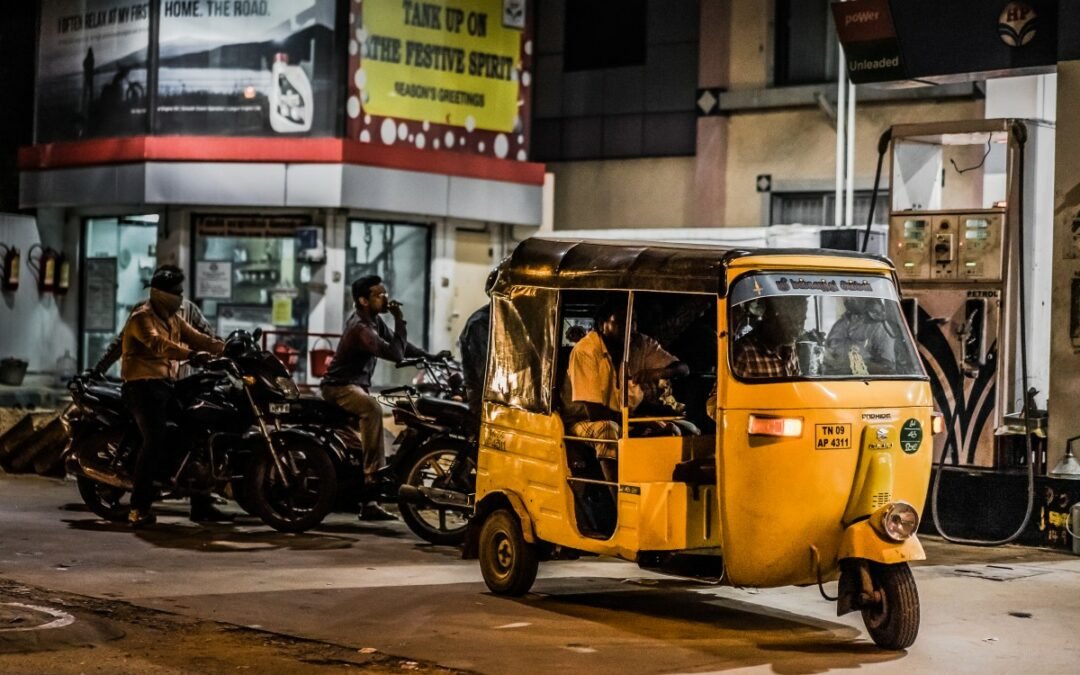Read in : தமிழ்
Tut, tut, trrrrrr…sometimes they even have a name for it: Burr Beat. It’s like hip-hop, evocative music, rhythm—hip and cool. It’s the sound of the Chennai auto.
There are more than 1 lakh autos in Chennai, 3 lakh all over the state. The auto sound is as much part of the city as the brutal bargaining the Chennai auto driver subjects you to.
No, the autorickshaw makers ensure it’s the normal, restrained sound that the vehicle makes while running. But many auto drivers, as soon as they take delivery of their three-wheeler, rush to Chintadripet for an upgrade.
So, what do the street-corner gearheads of the narrow bylanes of Chintadripet know that the finest engineers employed by reputable OEMs don’t? “The carburetor and the silencer need to be tuned,” says Murthy, an auto driver in Kilpauk. Murthy trusts the Chintadripet mechanic to ensure that his newly minted auto provides a mileage of at least 28 km per litre.
What do the street-corner gearheads of the narrow bylanes of Chintadripet know that the finest engineers employed by reputable OEMs don’t? “The carburetor and the silencer need to be tuned,” says Murthy, an auto driver in Kilpauk. Murthy trusts the Chintadripet mechanic to ensure that his newly minted auto provides a mileage of at least 28 km per litre.
Tuning the silencer often involves removing the internals of the device. And Murthy’s trust is based on sound engineering principles. The engine burns the fuel and produces a pressure pulse that makes the auto run. After the burning, the unburned gas is let out through a pipe. Designers ensure the passage doesn’t have bends or corners and the exhaust gas can freely leave the vehicle. If there is an obstruction or the passage is not smooth, then the engine has to work harder to pump the exhaust gas out. That means more fuel being burned.
Noise pollution norms dictate that the exhaust gas that is leaving is slowed down and its energy dissipated, reducing noise. But that means placing an obstruction in the passage of the engine, leading to a fuel efficiency penalty. It’s a trade-off we have come to accept. Burn slightly more fuel but keep the noise down.
For auto drivers eking out a living, the choice is clear: removing the silencer would save fuel. The few rupees they save can make a big difference for them.
Ramesh, another auto owner in Chennai, gives a back-of-the-envelope calculation: Rs 300 worth of petrol would mean the auto can run for some 80 km, giving the driver Rs 1,000 on a good day. This is about the most any auto will travel on a very good day, he says. Removing the silencer would give him an additional Rs 50. And that’s well worth it for an auto driver living on the margins. It could pay for a meal.
But, for Murthy and others, that’s just a perk. The real benefit is the sound. It gives them that feeling of riding a mean machine. Murthy insists that not only is the pickup greater – an engine that faces no backpressure can ramp up power quickly – but the ride is smoother too. Although unable to articulate how the autorickshaw without a silencer makes for better ergonomics, Murthy nevertheless says removing the silencer means no backaches or pain on the knees for him. “You can keep riding the auto without the silencer. It becomes a pleasure,” he says.
Ramesh, another auto owner in Chennai, gives a back-of-the-envelope calculation: Rs 300 worth of petrol would mean the auto can run for some 80 km, giving the driver Rs 1,000 on a good day. This is about the most any auto will travel on a very good day, he says. Removing the silencer would give him an additional Rs 50. And that’s well worth it for an auto driver living on the margins. It could pay for a meal.
Murthy says the sound is custom-made and that the Chintadripet gearheads offer him options. The typical metallic, loud sound is one thing. The burr beat is quite another. It’s more sophisticated, and sheer music, he believes.
Ramesh, though, says fewer auto drivers are going for the silencer removal these days.
Ramesh has regular customers who are white collar. He serves only a few, but every day. They wouldn’t want the loud sound. Neither does he.
Read in : தமிழ்











